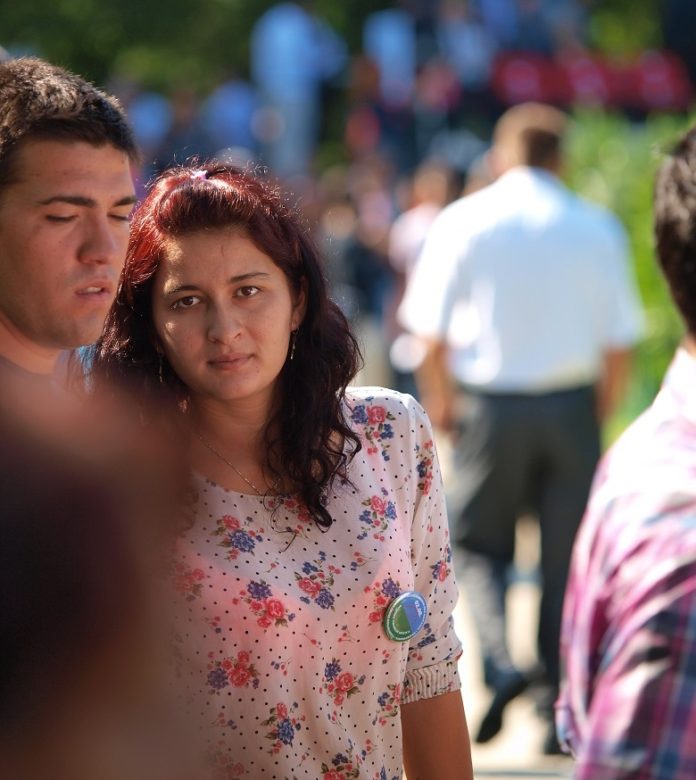According to the 2017 Country Report on Human Rights for Croatia, members of the Roma national minority continue to face numerous problems and challenges in the realization of their human rights as a result of historically based discrimination. Research data suggest that the social distance from the Roma in the Croatian society is almost 50 percent. Discrimination against the Roma is most pronounced in labour market and access to services. The above mentioned research also states that about a quarter of citizens believe that employing a Roma in the service sector would negatively affect customers’ inflows.
It should be added that according to the data of the Croatian Bureau of Statistics for the year 2017, the largest share of the unemployed population were women, in almost all age groups. Especially vulnerable group are women over the age of 40, women with disabilities and single mothers. There is a lack of quality and accessible education and re-skilling programs, specific measures and employment incentives for these vulnerable groups, and existing ones are inadequate. Consequently, women in Croatia have lower pensions and are on the verge of poverty.
The question is: What is the current status of Roma women? Besides being a member of a national minority, she is a woman and, like many other groups of society, discriminated against on several different grounds. Is Roma woman sufficiently involved in projects of the Roma community and is there discrimination by their own, Roma population? Answers to this question were obtained from members of the Roma national minority who are active in their communities, but also in the promotion of human rights in general.
ĐAVIT BERIŠA, activist and journalist, Germany
At a gathering on the occasion of the International Romani Language Day, which I attended in Zagreb, most of the participants were men, but older ones. In younger generations in Germany you cannot find a girl who married early and just finished elementary school. These are young girls who have finished high school, have a profession and are already working. Equality is imposed on a family, so a female child, whether we like it or not, is equal since the education system enables that. Roma are using this as well. Young girls choose who and when they will marry, and this is very often a case in Germany even though it has not taken roots completely yet in the Balkans. Parents often think “Oh, my daughter will remain unmarried, everybody from her generation has already married, she will stay single” or “My son is an engineer, right, but he will never manage to find a Roma girl now that he has graduated from school”- such thinking no longer exists in Germany, it is fading away. They get married and live with foreigners as well.
ALEN TAHIRI, Advisor in the Office for Human Rights and Rights of National Minorities of the Government of the Republic of Croatia
Yes, of course! Discrimination against the Roma women is visible. Namely, referring to a tradition is irrelevant; I believe that there is absolutely no justification. If I am not mistaken, there was one term of the Council of Roma National Minority of the City of Zagreb, where women accounted for more percentage than men and we are talking about an urban environment, however when we talk about smaller communities, unfortunately, the number of women involved in solving the problems of the members of Roma national minority can be counted on the fingers of one hand. So, besides Suzana Krčmar, who is the President of the Croatian Romani Union, we also have Ramiza Memedi, Nadica Balog and several younger activists whom we tried to motivate last year through the National Platform for Roma project, but they are somehow reluctant when it comes to taking that responsibility. We cannot generalize, but the issue of very few Roma women included does exist. This year and the previous one, we organized two events for the youth and Roma women and we tried to identify these members of the Roma national minority. Looking back on the past, in 2004 when I was a trainee at my first seminar for members of national minorities organized by the Office for National Minorities of the Government of the Republic of Croatia, there were a lot of girls, female colleagues who were extremely motivated to work with the Roma national community and who had the capacity to do so, but after the seminars were completed, when they acquired certain knowledge and wanted to start up something they were prevented in doing so from the male side of the Roma community or did not belong to a particular clan as it is specific for every community and then they simply gave up. The same happened not only with girls but also with young men. Recently, I have been running an analysis, since 2004, so far, 17 seminars have been held for young members of national minorities through which 350-400 participants have adopted certain knowledge. Some of us stayed, perhaps 4-5 of us, the others left. At the moment I do not see the solution how to keep them except to invest more in youth education. We have to awaken desire within the younger population of the Roma national minority towards activism and, by the end of these educational seminars, provide support through a network of youth associations that would bring together high school and faculty students. When it comes to scholarship holders, I think morally and ethically they should feel obliged to return their debt to the community that gave them the support by mentoring new generations. I do not know if anyone can be a better mentor to future students of the Faculty of Political Science than myself having the experience with professors, methods, methodology … If every Roma scholarship holder functioned this way and mentor at least one Roma member, this would set off a chain reaction and those students, together with the financial support, would be able to do something timely setting an educational elite.
We cannot compare the Roma and Jewish community, but we both passed down the Calvary road together. They have their educational elite and on that grounds they have managed to gain economic power and do not want anybody to put them in the position they were in during a rough period of history. The Roma are still hanging out there. This community debt has to be paid. I am not always in the mood to do something but the community was there when I needed it, now it is my turn.

DAUT QULANGJI, journalist and editor of the Kosovo National Television Roma Programme Yekhipe, Kosovo
It would be desirable for a greater number of Romani women to be involved in projects related to the Roma community. The problem is that it is very difficult to include them on a voluntarily basis. Even when there is a statutory or other provision requiring their involvement, the Roma women attend, but with very low attendance. In my opinion, there are various reasons, for example, economic or traditional upbringing which does not identify social activism as something a woman should be engaged in. Dominant image of a woman is that of a mother and housewife. However, recently we can detect certain progress and an ever-growing interest in inclusion, especially among young Roma women, but much work needs to be done still.
RAMIZA BERIŠA, Roma activist, Germany
I live in Germany where the Roma community is very active. Women of the older generation, but also young girls regularly come to our meetings which usually begin with stories about our children, their upbringing and education. Our goal is to cultivate our language, music and dance. We also organize and prepare exhibitions. One of the most beautiful meetings each year is exactly the one we organize on the occasion of the International Women’s Day, March 8th. We always come together in great numbers, and there are Roma women from many cities in Germany. As far as employment is concerned, Roma women in Germany have no problems, especially if they are educated. For this reason, mother always tries to emphasize to her children the importance of education and provide it.
PAMELA PALKO, President of the “Sara” Romani Association, Croatia
The biggest problem is discrimination, nothing else. If you want to find a job, the first problem you will encounter is that between a Roma woman and a non-Roma woman an employer will always choose the later. We can never be in the foreground; we are inhibited wherever we go. Personally I have not been rejected myself, I cannot complain, but I know a lot of women who have been exposed to mockery, called bad names and similar.
SUZANA KRČMAR, President of the Croatian Romani Union “KALI SARA”, Croatia
In urban environments, women can easily get education and find jobs, get more involved in activities in the towns they live in. Everything is much harder in the settlements because they are separated from everything. Early marriages are still present, not as much as before though, tying them to the house and the settlement. Because of the limited use of transportation, they cannot, on their own initiative, go out shopping or in the city closest to the settlement in which they live. A woman like this is too busy with her children and housework, and she cannot even think of what she wants in life. She is reduced to the trivial daily routine. An educated woman with a job is treated differently by her community, by her family even and she is more self-confident. A lot of Roma women have not even graduated from the primary school, and they are not aware that they are setting an example to their children.
UNA BERIŠA, journalist of the Romani programme, Radio Belgrade, Serbia
There is too much discrimination against the Roma women. When I say that, I mean discrimination in everyday life, but also when it comes to Roma women involvement in project activities related to problem solving of their community members.
It is a general knowledge that Roma women are discriminated against on double grounds. Most of the members of the general population look at us Roma women with distrust and suspicion and have a preconceived view that Roma women are less educated, less valuable and less able than other women. Some projects, organized by the majority people, contribute enormously to this by pushing the Roma women to the margins, regardless of the country in question. The very members of the Roma community contribute to such situation themselves. First, Roma men still see Roma women as a weaker sex and still do not realize that women are equally capable of triggering changes as men, perhaps even to a greater extent. In support of this, there is evidence that Roma girls are more likely to complete their faculties and high schools than young Roma men. Second, both Roma men and women, as though they still have inferiority complex, prefer to engage members of the majority population in projects, even though they have less education or are less familiar with the topic of the project.
I would not want to be misunderstood in this way because in my many years of work I worked with many non-Roma and I learned a lot from those who were open-minded, without stereotypes and prejudice, helping to bring the Roma issue in the right light and to improve the position of our community. I believe that lately the Roma question has become a lucrative job and many have been involved for their own interests, I also believe that Roma women are marginalized in projects and, more importantly, excluded from the process of policy making and decision-making. Strategic and legislative framework for advancing the status of the Roma has been adopted in Serbia. The Action Plan for implementing the Strategy for advancing the status of the Roma has been adopted as well, but unfortunately, in practice the Roma are least concerned. This is not a problem only in Serbia, but in most countries. Money allocated to protect and improve the status of Roma is spent in a non-transparent manner for other purposes, while, unfortunately, more and more non-Roma make decisions on behalf of the Roma. My opinion is that this problem can be resolved by involving more Roma in the work of the institutions that make policies and decide on projects, by higher expertise of project executives, and by a transparent way money is spent for inclusion of Roma community members.













